

The right type of bike? Resources That Early Childhood Teachers Can Share to Promote SEL at Home. Social and emotional learning happens everywhere—in the classroom, on the bus, at the kitchen table, on the playground, at a neighborhood barbecue—and families are core to a child’s social and emotional development.
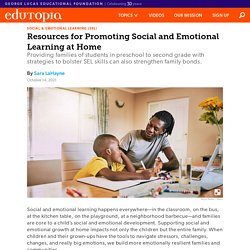
Supporting social and emotional growth at home impacts not only the children but the entire family. When children and their grown-ups have the tools to navigate stressors, challenges, changes, and really big emotions, we build more emotionally resilient families and communities. Educators have worked hard to build closer bonds with families during the pandemic, and maintaining and deepening family engagement is top of mind. Getting the “Think-Pair-Share” Technique Right - ASCD.
Most educators are familiar with Think-Pair-Share, a popular technique used to ask questions in class and promote peer collaboration and communication.
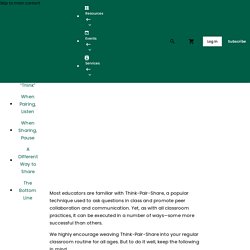
Yet, as with all classroom practices, it can be executed in a number of ways—some more successful than others. We highly encourage weaving Think-Pair-Share into your regular classroom routine for all ages. But to do it well, keep the following in mind. Don’t Skimp on the “Think” The searing memories of the curriculum era – Matthew Evans. For the last 18 months, I have been co-authoring a book with Becky Allen and Ben White.
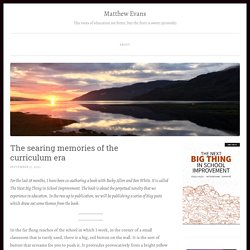
It is called The Next Big Thing in School Improvement. The book is about the perpetual novelty that we experience in education. In the run up to publication, we will be publishing a series of blog posts which draw out some themes from the book. In the far flung reaches of the school in which I work, in the corner of a small classroom that is rarely used, there is a big, red button on the wall.
It is the sort of button that screams for you to push it. How Empathy Maps Can Help Teachers Connect With Middle and High School Students. In education, an empathy map is a simple visual that captures knowledge about the behaviors, attitudes, needs, strengths, struggles, emotional states, and other key attributes of a particular student or group of students.
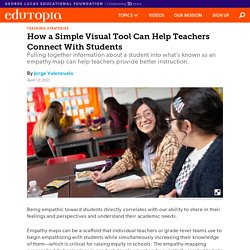
In my coaching work with schools, the empathy-mapping process primarily becomes a helpful tool to assist grade-level planning teams in empathizing with their students and developing more equitable and personalized lessons. Creating maps helps teachers consider things from the students’ perspectives and takes into account a child’s interests and challenges. Empathy maps also provide the following benefits: The Essential Linnea Ehri. Coaches - Beyond EI. Social-emotional learning. Ascd. Emotional Intelligence for School Leaders — EPIC Impact Education Group. Developing emotional intelligence in school leaders is critical to meet the needs of a staff that is engaged in developing a common vision for their school, maintaining a focus on high achievement for all students, and creating a school culture of trust and respect.
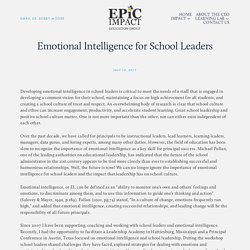
An overwhelming body of research is clear that school culture and ethos can increase engagement, productivity, and accelerate student learning. Great school leadership and positive school culture matter. One is not more important than the other, nor can either exist independent of each other. Over the past decade, we have called for principals to be instructional leaders, lead learners, learning leaders, managers, data gurus, and hiring experts, among many other duties. However, the field of education has been slow to recognize the importance of emotional intelligence as a key skill for principal success.
Good Collaboration Toolkit — The Good Project. The Good Collaboration Toolkit is a collection of materials designed to help individuals and groups develop and nurture effective collaborations.
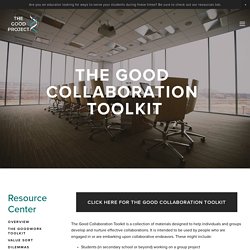
It is intended to be used by people who are engaged in or are embarking upon collaborative endeavors. What Makes a Great School Leader? Visionary Leadership You've probably heard a term like "visionary leadership" used in reference to a site leader.
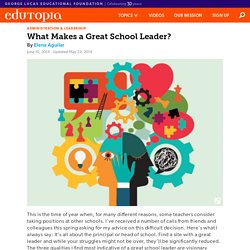
But what does that mean? How do you know if a leader is a visionary? A visionary leader is clear about what he or she believes and knows is best for children -- for their academic, social, and emotional learning. The leader's individual beliefs have developed in collaboration with other stakeholders and articulated into some kind of vision or mission statement.
Emotional intelligence: why it matters and how to teach it. In our work with schools, it’s now commonplace for us to hear those in education talking about helping students (and staff) develop their emotional intelligence.

But what do we mean exactly? Why and how should teachers support its development in their students? Emotional intelligence can be said to cover five main areas: self-awareness, emotional control, self-motivation, empathy and relationship skills. It is, of course, important for good communication with others – and is therefore a gateway to better learning, friendships, academic success and employment. Skills such as these developed in our formative years at school often provide the foundation for future habits later on in life. Getting students learning 4 – why motivation is the wrong goal. Teachers often ask “How can I motivate my students to learn?”
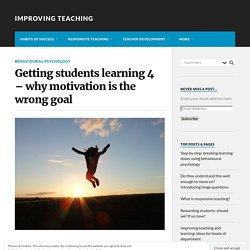
But increasingly, I’ve come to believe that this is the wrong goal, and the wrong question. Trying to motivate students seems logical. Bored students try less and do worse (Tze et al., 2016). Students say they are bored much of the time; Caplan, 2018). But motivating every student – every lesson – is impossible. Leadership. I can recall my early days of teaching vividly.
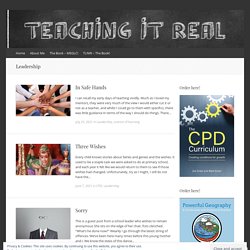
Much as I loved my mentors, they were very much of the view I would either cut it or not as a teacher, and whilst I could go to them with specifics, there was little guidance in terms of the way I should do things. There… Every child knows stories about fairies and genies and the wishes. It used to be a staple task we were asked to do at primary school, and each year it felt like we would return to them to see if those wishes had changed. Who Drives Social-Emotional Learning? The value of a holistic education that prepares children through Social-Emotional Learning (SEL) has gained attention and fanfare over the last several years in the Western hemisphere. Programmes, research centres, and organisations, including the UN,[1] are acknowledging that the focus on teaching for the test is insufficient and that education needs a thorough “rethinking[2].”
Enterprising initiatives stress the “new” focus to teach what have, in previous iterations of schooling, been considered the “soft skills” of character education to help young people navigate the vicissitudes of life. We emphasize the word “new” here because ideas of holistic education that address the interplay of mind, body, and spirit, are not new. Aspects of SEL, including critical inquiry, mindfulness, compassion, and empathy, are part of learning systems in many world cultures.
What is new in the greater scheme of human history is the industrial age shift to education for worker and civic development. . [2] In school systems around the world, there’s growing appreciation of the importance of social and… In school systems around the world, there’s growing appreciation of the importance of social and emotional learning (SEL). But ask a few people to define SEL, and you’re likely to hear a few different responses.
One of the most widely cited definitions is that of our nonprofit, the Collaborative for Academic, Social, and Emotional Learning (CASEL). The Happy Leader – Leading with love and joy as core values. Ready to step up to school leadership? Back when I first took my first leadership role, I felt more than ready. In fact, I felt positively overdue. I was confident, cocksure, even – and definitely arrogant in my assumption that my natural ability to command attention far outweighed the niggle that my expertise in subject knowledge was not exhaustive. I thought my ability to be composed when confronted with students' extreme emotions meant that I could deftly manoeuvre complex conversations with colleagues. Make Body Language Your Superpower. Youtube. Emotional Intelligence Consortium - Articles, Research and Information on Emotional Intelligence.
John Maxwell Leadership Podcast. The Most Powerful Leadership Tool You Have: Your Own Example. Lead with Authenticity. How to Be A Great Leader In A World Of Control Freaks - Lolly Daskal. Chances are, somewhere in your professional or personal life you’ve encountered an all-out control freak. They’re the ones who think they know best about everything, who refuse to delegate anything, who incessantly judge other people’s choices, and who want to micromanage every detail of everything they’re part of. Forced to go with someone else’s plan, they may quickly become moody or sulky.
There’s certainly no shortage of control freaks in most organizations. You may not be able to escape them, but as a leader it’s part of your job to mitigate their behavior and show them more effective alternatives. Here are some ways to protect your team from control freaks and turn controlling team members toward a leadership mindset: Embrace opportunities to give useful feedback. Dan Ariely: What makes us feel good about our work? Preview - Scopus - Welcome to Scopus.
Youtube. Red Bull Racing's Christian Horner on building resilience and self belief. Learning as, with and because of a group. Dylan Wiliam: Teachers need to take a fresh look at research on feedback. Advice for teachers about feedback is not hard to find. Books, articles, postings on social media and professional development sessions confidently assure teachers that feedback should be specific, positive and immediate. While effective feedback does often have these features, a quick survey of the research on feedback shows that research in this area is nowhere near as clear cut as these assurances would suggest, for several reasons. Research on feedback: The age-group issue The first, and possibly most important, reason why feedback research often fails to provide useful guidance for teachers is that most – Maria Ruiz-Primo and Min Li estimate about 75 per cent – published feedback studies are conducted on university students.
In addition, in most of these studies, feedback is a single event, lasting minutes. Short timespans. Beware of Equity Traps and Tropes. Does It Make a Difference? Evaluating Professional Development. Fundamentals for getting back on track. Earlier this week I posted this tweet: This was partly in response to hearing various proposals from official folk and the normal Big Voices suggesting schools extend their days and offer all kinds of extras.
The 110 techniques of communication and public speaking. The magical science of storytelling. Why we all fall foul of the Dunning-Kruger effect - BBC Reel. Why is improvement difficult in schools? Perhaps naively, I’ve always envied those who’ve worked in a brand new school. The idea of having a blank slate onto which you can write your curriculum or your feedback policy or whatever feels compellingly different. The value of sharing bad practice – Dr Heery. Several years ago, I was given the task supporting a school in an Interim Headship capacity that had recently been placed into Special Measures. The teachers were hardworking and keen to improve but the school was in a challenging context, and over time inconsistency in the quality of teaching had led to entrenched low outcomes. Benjamin Zander Shining Eyes Clip.
Why Leading a Remote Team Requires Radical Candor. Research for Better Teaching. IB Educators Zoom. Leadership Archives. Why Good Teachers Quit She is an amazing teacher who is ready to quit the job she has loved for 20 years. 5 Keys to Social and Emotional Learning Success. #1 Excel tutorial on the net - Excel Easy. Free personality test, type descriptions, relationship and career advice. A Satisfying Narrative – Simple stories of complex change. Why Emotional And Social Intelligence Are Must-Have Leadership Traits. Founder of the Legacy Leaders Institute, Transforming Executives & Entrepreneurs into High-Performing Impact Leaders. The Three Parts of an Effective Apology.
5 Words That Are Commonly Used But NOT Commonly Understood (Opinion) Over the last 26 years that I have been in education as a teacher (11 years), principal (eight years) and leadership coach/author/instructor/facilitator, I have noticed that we often have a common language in schools but lack a common understanding. This can create many issues in schools. Youtube. About Academic Phrasebank - Academic Phrasebank. The Future of Teaching & Leading is in Our Hands. 69 Exercises For Leading With Emotional Intelligence. The Focused Leader. Is your feedback falling flat? Radical Candor can fix your feedback fails. - Radical Candor Framework. If Technology is the Answer, What Was the Question? Emotional Intelligence Coaching and Training. The Triple Focus: A New Approach to Education – Key Step Media.
The 10 Most Significant Education Studies of 2020. Project X. Trapped in the Fog -Leadership – #OnTheBus. Leadership Lessons from The Pandemic_ Learning, Links, Lucidity and Love from Justin Hardman on Vimeo. The CultureOps Podcast. Radical Candor: 5 tips for awkward conversations. The Importance of Emotional Intelligence in a Leader. 11 Email Marketing Frequency Best Practices for 2020. Teachers Takeaway. Are You Activity Rich and Impact Poor? (Opinion) 03 - Intrepid ED News. Craig Groeschel Leadership Podcast. How to Disagree: Negotiate difference in a divided world.: 20 thought-provoking lessons (BUILD+BECOME) eBook: Ferner, Adam, Chetty, Darren: Amazon.co.uk: Kindle Store. 12 Principles Of Modern Learning: From Inquiry To Social Learning. DEAL: Developing Emotional Awareness and Listening. WorldSkills. Why your most important relationship is with your inner voice.
Emotional Intelligence: Why It Can Matter More Than IQ: Daniel Goleman: Bloomsbury Publishing. Why embracing change is the key to a good life - BBC Culture. Critical thinking. Balanced news via media bias ratings for an unbiased news perspective. How Do We Fix It? 2020 Year-in-Review: Five Big Ideas in Professional Learning. About the Authors: The Robb Review Blog. Why More and More Companies Are Ditching Performance Ratings. Leadership & Executive Coaching. PDC in MFL: research for language teaching.
The Subtle Art of Not Giving a F*ck (2 books) Kindle Edition.